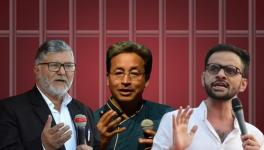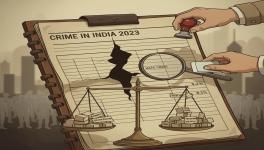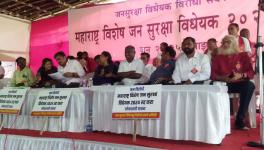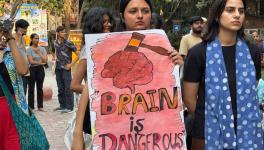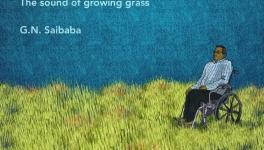“We Need to Reclaim the Physical Spaces to Protest”
As the pandemic is ensuring that we move towards the digital space and the government is continuing to wreak havoc on dissenters, ICF is attempting to get a sense of the changing cultural space around us by talking to people from varied fields.
In this conversation with Daniya, renowned graphic artist Orijit Sen talks about his works; censorship and trolling; reclaiming the physical space and much more.
Daniya Rahman (DR): A lot of your work is a funny and satirical take on topics that are often fearful and tragic. How do you do that? Do you not fear that these works can easily slip into bad taste?
Orijit Sen (OS): I think taste is a problematic thing in any case. I question the idea of good taste and bad taste because it's very contextual. That's on one level. At another level I would say I don't think the work either originates in humor or ends in humour. Humour is just a medium. My work originates usually in anger or in some kind of sorrow or pain and I use humour to channelise those feelings. In the end, I try, through humour, to communicate those feelings to my audience. I don’t think in terms of good taste or bad taste, in fact if it offends some people's sense of taste, it's only for the better.
DR: Your satire is quite provocative and many people easily take offense. So, many times your posts have been taken down from Facebook, for instance. How do you respond to the censorship and trolling?
OS: In the cases where I've been censored by Facebook, I wait for the point when I’m allowed back online and use that medium itself to talk about censorship. It's usually kind of effective in the sense that I get a lot of support when I talk about having been censored because it's something that obviously affects everybody. I mean the idea is that social media is used to kind of put out our views or engage in conversations but at the same time you can be censored on it. Nobody likes this, it's against everybody’s interests. So I use the medium to talk about that. So in a way, I think it helps not just me or those who support me but also it gets the message out to the people who are doing the censoring.
When it comes to trolling, I have basically developed a thick skin for trolls so I don't care. If there’s a lot of abuse and bad language and like that, I just delete them and block them. If the trolling is not very intense, I just leave it for other people to see what kind of reaction is coming.
DR: People speaking against the government are increasingly being hounded and persecuted. In such times, have you ever been in two minds about sharing your works since they are so unabashedly critical of the government?
OS: Yes. I mean this has been always the case and I do feel scared at times, but I feel all the more that at this time one has to not succumb to that because I think the most insidious and dangerous form of censorship is self censorship. I, in fact, started to post a lot of my words on Facebook around 2014 before Modi actually became prime minister. There was this episode where Penguin withdrew its book called The Hindus because of some threats from some obscure organisation and that really made me sit up and take notice because I was like, wow, a huge international long-established and well-known kind of publishing house is scared that some obscure organisations will just pop up and start issuing threats. That was really a scary situation and it was time that all of us who are artists, writers and others, question the idea of being silenced in this way. And so, yes, I am fearful at times, but I try and overcome that and go ahead with what I'm doing.
DR: In all probability, large gatherings will not be allowed for a while to come and everyone is anticipating a move towards the digital space. Yet, in a country like India, that space still remains out of the reach of a large number, whether it is artists/performers or spectators. Who do you see being left out? What kind of interventions would be required to bridge this gap?
OS: I think that the public space has to be reclaimed. It cannot be replaced by the digital and it is really sad and unfortunate that that whole public sphere has been blocked. I don't know, we have to think much more about how to get back into the public space because we can't claim to replace it with the digital. That's just not happening. So I think that while the digital tools, as a result of this lockdown, are getting more activated and there are people willing to do more online, which is a good use of the digital communication channels, but in no way is that going to replace the physical and I think this physical space will have to be reclaimed. Sooner or later.
It's a real pity because during anti-CAA protests, we were seeing a real insurgence of the physical spaces and that’s just been totally wiped out. So, it's really sad and I think we have to try and activate that again.
DR: But do you see it anywhere in the near future? I mean, given the pandemic no one is really willing to step out.
OS: Well, I mean, I don't know. Recently a lot of citizens in Goa came out on the railway tracks to protest against the proposed double-tracking of all the railway lines from Hospet to Vasco-da-Gama because of coal transportation and they've been fighting coal transport in any case. So, people did come out. They came out and stood on the tracks and they protested. So, we have to pay to start doing that again. I mean, we have to create a safer space, you know the mask wearing and all that, people have to be very serious about doing that, taking other precautions and keeping some distance. You would still have to come back out into the streets and I hope it will happen sooner than later.
DR: How does this specifically affect visual artists? Are any efforts being made to ensure that they are able to sustain themselves?
OS: No, I don't think so. I'm not aware of any efforts and I think visual artists are suffering. I mean, of course at one level we've had some mobilisation around supporting artisans. So, some of that has been happening in terms of supporting them financially. But creating alternative spaces for their work and for themselves to present, that is not happening. At least I'm not aware of and again, that is something that we need to pay attention.
DR: Do you have any suggestions on what can be done? What should be happening right now, but isn’t, in terms of the help that can be provided apart from financial help.
OS: It's one thing to say we need to come out and protest on the streets and all of that. That's still I think something doable. But we can't have events where people gather together in close proximity, whether it’s an exhibition or be part of a performance or something like that I think is not possible right now. So for visual artists or any other kind of art practice, for now, has to be just online. I can’t see other solutions at the moment other than that we need to get more inclusive. I think right now the online space is available only to certain segments of the people. And it needs to become more inclusive.
People are online, it's just that those spaces are not being used for art or performance orthings like that. I mean everybody uses WhatsApp. How do we kind of enter into those spaces with art? We have to start engaging with WhatsApp groups and try to slowly appreciate that in terms of creating spaces for art and artworks and artists to reach people.
DR: One last thing, would you like to say anything about the several political prisoners?
OS: Obviously the government is trying to sort of keep them incarcerated and they're hoping maybe that these people even succumb to some disease or to old age or whatever. So, I think it’s an urgent thing and we all need to speak up on behalf of the poets and artists and activists who are in prison right now.
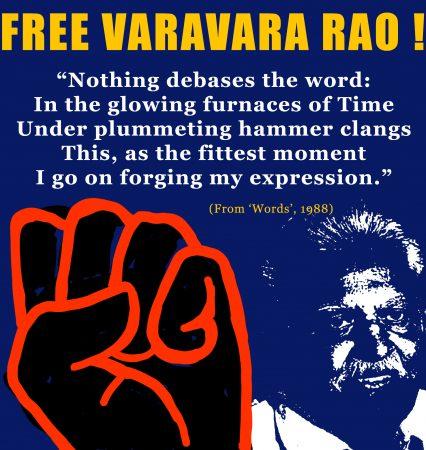
Poster by Orijit Sen
Get the latest reports & analysis with people's perspective on Protests, movements & deep analytical videos, discussions of the current affairs in your Telegram app. Subscribe to NewsClick's Telegram channel & get Real-Time updates on stories, as they get published on our website.









